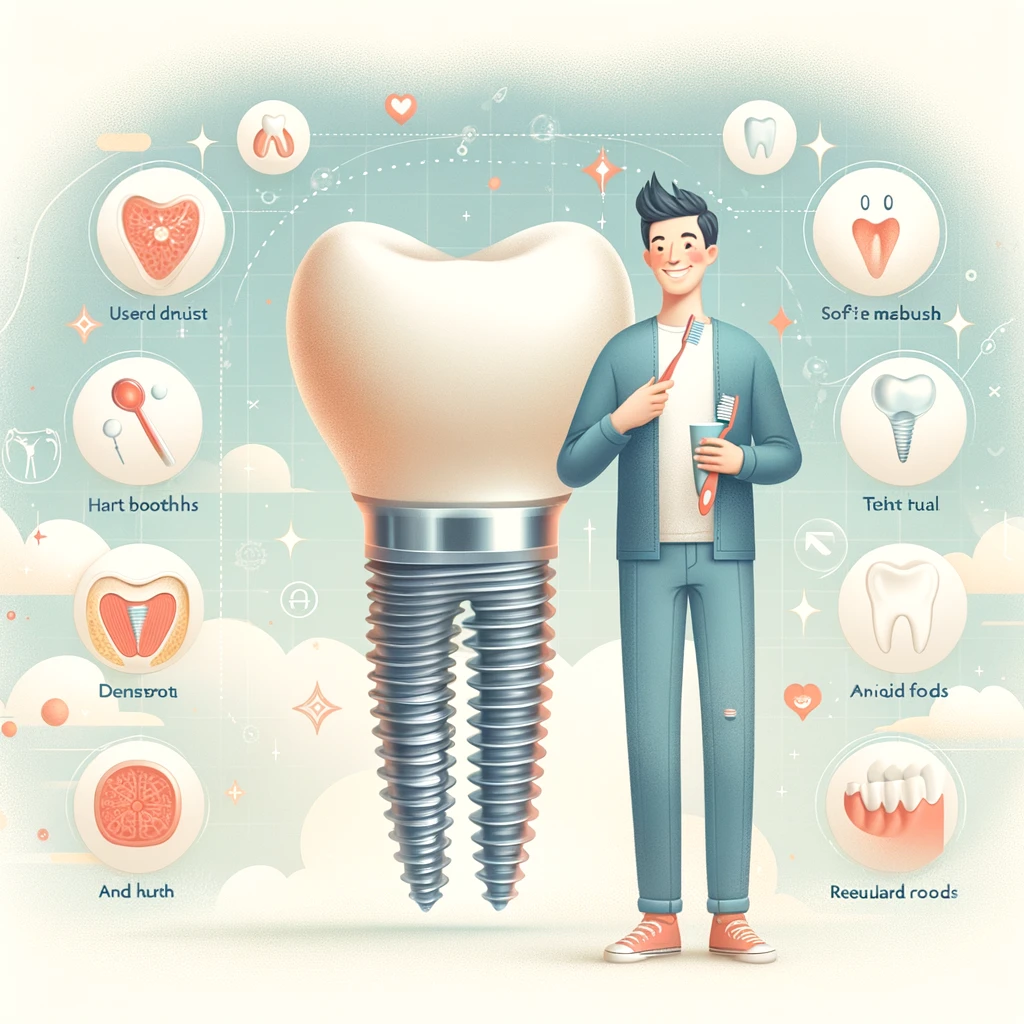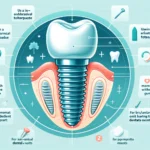Introduction
Caring for Dental Implants have revolutionized the field of dentistry, offering a permanent and natural-looking solution for missing teeth. As someone who has undergone dental implant surgery myself, I can attest to the importance of proper care and maintenance to ensure the longevity and success of your implants. In this comprehensive guide, I will share my personal experience and expert insights on caring for dental implants, so you can enjoy a healthy, beautiful smile for years to come.
Understanding Dental Implants
Before we dive into the specifics of caring for dental implants, let’s take a moment to understand what they are and how they work. Dental implants are artificial tooth roots, typically made of titanium, that are surgically placed into the jawbone to support a prosthetic tooth or bridge. The implant fuses with the bone through a process called osseointegration, creating a stable foundation for the replacement tooth.

Components of a Dental Implant
A dental implant consists of three main components:
The implant:
This is the titanium post that is surgically placed into the jawbone, acting as the tooth root.
The abutment:
This is a connector piece that is attached to the top of the implant, providing a surface for the prosthetic tooth to be attached.
The prosthetic tooth:
This is the visible part of the implant, custom-made to match the color, shape, and size of your natural teeth.
The Importance of Caring for Dental Implants
Proper care and maintenance of your dental implants are crucial for several reasons.
Longevity:
With appropriate care, dental implants can last a lifetime. Neglecting your implants can lead to complications and potentially shorten their lifespan.
Oral health:
Caring for your dental implants helps maintain the health of your gums and surrounding teeth, preventing issues like gum disease and tooth decay.
Aesthetics:
Regular cleaning and maintenance keep your implants looking natural and attractive, ensuring a confident smile.
Daily Care Routine for Dental Implants
Caring for dental implants involves a daily oral hygiene routine similar to that of natural teeth, with a few additional considerations.
Brushing
Brushing your teeth and implants twice a day is essential for removing plaque and preventing the buildup of harmful bacteria. Use a soft-bristled toothbrush and non-abrasive toothpaste to avoid scratching the surface of your implants. Pay special attention to the area where the implant meets the gum line, as this is where plaque tends to accumulate.
Flossing
Flossing is just as important for dental implants as it is for natural teeth. Use unwaxed tape or implant-specific floss to clean between your teeth and around the implant posts. Be gentle when flossing to avoid damaging the gums or disturbing the implant.
Interdental Brushes and Water Flossers
In addition to traditional flossing, interdental brushes and water flossers can be effective tools for cleaning hard-to-reach areas around your implants. Interdental brushes come in various sizes and can help remove plaque and food particles from the spaces between your teeth and implants. Water flossers, such as Waterpik, use a stream of water to clean around the implants and can be especially helpful for those with dexterity issues or hard-to-reach implants.
Mouthwash
Using an antimicrobial mouthwash can help reduce the risk of gum inflammation and infection around your dental implants. Look for alcohol-free mouthwashes that contain ingredients like chlorhexidine or essential oils, which have been shown to be effective in controlling plaque and gingivitis.
Dietary Considerations for Dental Implants
While dental implants are designed to function like natural teeth, there are some dietary considerations to keep in mind to ensure their longevity and prevent damage.
Avoiding Hard and Sticky Foods
it’s essential to avoid hard, crunchy, or sticky foods that can put excessive pressure on the implant or cause it to become dislodged. Examples include:
Hard candies
Nuts
Popcorn kernels
Chewy candy or gum
Tough meats
As your implant heals and integrates with the jawbone, you can gradually reintroduce these foods into your diet, but it’s still a good idea to exercise caution and avoid biting directly on hard objects with your implant.
Maintaining a Balanced Diet
A balanced, nutritious diet is crucial for the health of your dental implants and overall oral health. Ensure that you consume a variety of foods rich in vitamins and minerals, particularly calcium and vitamin D, which are essential for maintaining strong bones and supporting your implants.
| Nutrient | Recommended Daily Intake | Food Sources |
|---|---|---|
| Calcium | 1,000-1,200 mg | Dairy products, leafy greens, fortified foods |
| Vitamin D | 600-800 IU | Fatty fish, egg yolks, fortified foods, sunlight exposure |
Professional Dental Care for Implants
Regular dental check-ups and professional cleanings are essential for maintaining the health of your dental implants and detecting any potential issues early on.
Dental Check-Ups
Visit your dentist at least twice a year for a comprehensive examination of your implants, gums, and surrounding teeth. During these check-ups, your dentist will:
Assess the stability and function of your implants
Check for signs of gum inflammation or infection
Evaluate the fit and condition of your prosthetic teeth
Take x-rays to monitor the bone levels around your implants
Professional Cleanings
Professional dental cleanings, also known as prophylaxis, should be scheduled every six months or as recommended by your dentist. During these cleanings, a dental hygienist will:
Remove plaque and tartar buildup around your implants and natural teeth
Polish your teeth and implants to remove surface stains
Provide personalized oral hygiene instructions and recommendations
Addressing Common Implant Concerns
Despite your best efforts in caring for your dental implants, issues may still arise. Be aware of the following common concerns and know when to seek professional help.
Peri-Implantitis
Peri-implantitis is an inflammatory condition that affects the gum and bone surrounding a dental implant. It is caused by the buildup of bacteria and can lead to bone loss and implant failure if left untreated. Signs of peri-implantitis include:
Red, swollen, or tender gums around the implant
Bleeding when brushing or flossing
Pus or discharge from around the implant
Loosening or mobility of the implant
If you suspect you may have peri-implantitis, contact your dentist immediately for evaluation and treatment.
Loose or Damaged Prosthetic Tooth
Over time, the prosthetic tooth attached to your implant may become loose or damaged due to wear and tear or accidents. If you notice any of the following signs, schedule an appointment with your dentist:
Movement or spinning of the prosthetic tooth
Visible cracks or chips in the prosthetic tooth
Changes in the fit or comfort of the prosthetic tooth
Your dentist can repair or replace the damaged prosthetic tooth to restore the function and appearance of your implant.
Long-Term Success of Dental Implants
dental implants have an excellent long-term success rate. Studies have shown that the survival rate of dental implants can be as high as 95-98% over a 10-year period.
| Implant Location | 5-Year Survival Rate | 10-Year Survival Rate |
|---|---|---|
| Mandible (lower jaw) | 95-97% | 93-95% |
| Maxilla (upper jaw) | 90-95% | 88-93% |
To ensure the long-term success of your dental implants, it is crucial to:
Maintain a consistent oral hygiene routine
Attend regular dental check-ups and cleanings
Address any concerns or issues promptly
Avoid habits that can damage your implants, such as smoking or using your teeth as tools
My Personal Experience with Caring for Dental Implants
As someone who has undergone dental implant surgery, I can personally attest to the importance of proper care and maintenance. When I first received my implants, I was diligent about following the post-operative instructions provided by my dentist, which included gentle brushing, salt water rinses, and avoiding hard or sticky foods.
As I healed and my implants integrated with my jawbone, I gradually returned to my normal oral hygiene routine, incorporating the tips and techniques I’ve shared in this guide. I make sure to brush twice a day, floss regularly, and use an interdental brush to clean around my implants. I also schedule regular check-ups with my dentist to ensure that my implants remain healthy and functional.
Thanks to my commitment to caring for my dental implants, I have been able to enjoy a comfortable, confident smile for years. I encourage anyone with dental implants or considering the procedure to prioritize their oral health and follow the advice outlined in this guide. With proper care, your dental implants can last a lifetime, providing you with a beauty functional smile.
Conclusion
Caring for dental implants is a lifelong commitment that requires dedication and consistency. By understanding the components of your implants, maintaining a thorough daily oral hygiene routine, making smart dietary choices, and seeking regular professional care, you can ensure the long-term success and health of your dental implants.
Remember, your dental implants are an investment in your oral health and quality of life. By taking the time to care for them properly, you can enjoy the benefits of a beautiful, functional smile for years to come. As someone who has experienced the transformative power of dental implants firsthand, I encourage you to prioritize your oral health and follow the guidance provided in this comprehensive guide.
If you have any questions or concerns about caring for your dental implants, don’t hesitate to reach out to your dentist for personalized advice and support. Together, you can work towards maintaining a healthy, confident smile that you can be proud of.

